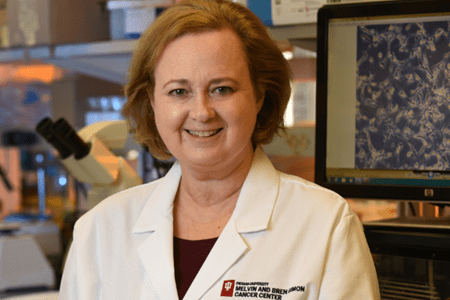When Karen E. Pollok, PhD, saw an opportunity to do the kind of research nobody else was dedicating the time to, she jumped at it.
She’s a researcher — curiosity just comes with the profession. But listening to stories from patients’ families and other loved ones gave her an extra jolt of motivation.
Pollok’s lab bears the name of Caroline Symmes, who was just under 4 years old when she was diagnosed with metastatic Wilms Tumor and just 5 years old when she passed away.
Pollok has met multiple parents and families of pediatric cancer patients just like Caroline throughout her career, occasionally hosting them at her lab to share their stories with staff and students.
"I've had parents tell me 'When I come here, it makes me remember my child, which is tough, but it also gives me the hope that one day this doesn't have to happen to families anymore'," Pollok said.
Among the cancers that Pollok's lab works to understand and treat is sarcoma, which Pollok's background is particularly well suited for.
She earned a PhD from the University of Kentucky in 1990 before going on to postdoctoral training at the IU School of Medicine. Her training began with immunology but transitioned to hematology/oncology when she transitioned to working at the Herman B Wells Center for Pediatric Research, where she says the collaborative environment and "bench-to-bedside" approach substantially enhanced her work.
Her initial work at the Wells Center focused on bone marrow, particularly novel approaches to prevent therapy-mediated bone marrow toxicity in cancer patients. That ultimately led to an interest in pediatric solid tumor treatment and the research behind it. The chemotherapy regimens used to treat sarcomas can have an adverse effect on bone marrow well as other organs and tissues, resulting in long-term adverse effects, even in those who have their cancer cured.
Researchers at the time were beginning to understand the mutational profiles of tumors, an area Pollok believed was ripe for research and discovery. This is where Pollok, and her experience working with bone marrow, came into play.
Pollok pivoted her lab’s work to understanding the molecular signatures of tumors while looking for methods to develop novel therapies that can treat tumors without adverse effects, an area she saw as needing more dedicated research.
"A lot of the chemotherapies that are used today to treat our young folks can have really long-term adverse effects on them," Pollok said. "In 10, 20 years or so we'd love to have chemotherapy out and have more of these targeted approaches in."
Pollok and her colleagues have worked to develop a patient-derived xenograft pipeline. When clinical staff have extra tumor specimens not needed for diagnosis and the patient and family consent to the donation, Pollok's team receives a small sample of this donated tissue. In partnership with the core facility at the IU Simon Comprehensive Center, they work to establish tumor models that can be used for further research into testing novel therapies and understanding underlying mechanisms of response and resistance.
It's essential to develop these models within the institution itself, Pollok said, because researchers have access to the patient's de-identified clinical history. There's never any identifiable information attached to donated samples, so the work remains in compliance with HIPAA guidelines.
Then, one day in 2018, Pollok and her team heard about a patient and their family who wanted to know what had become of the samples they'd donated: those of Tyler Trent, a Purdue University student and avid sports fan who had been diagnosed with osteosarcoma and later died from the disease on Jan. 1, 2019.
It was the first time they'd ever received such a request. With the family’s consent, Pollok’s team was allowed to consult with their clinical colleagues to track down the information, finding that they had in fact generated two tumor models from Trent’s donated tissue.
The two models are now known as TT1 and TT2, for Trent's initials.
"We were able to obtain amazing data sets out of Tyler's model using targeted combination therapy based on its molecular signatures," Pollok said.
One of the targeted therapies Pollok’s lab is currently working on is the usage of Bromodomain and Extra-Terminal (BET) protein inhibitor drugs as a potential treatment for osteosarcoma.
With BET inhibitors showing promise, Pollok and her team are looking to move on to clinical trial development. The data sets generated from Trent's models were integral to the lab’s work in that regard, Pollok said.
They do so with the hope that patients like Caroline Symmes and Tyler Trent and their families have access to effective treatment in the future.
"As scientists, we’re curious people by nature," Pollok said. "We're curious about how our world works and how our body works. Combining our curiosity with this human aspect of it, where we know so many patients that have passed on because of their cancer, is extremely motivating and drives our team to never give up in search of a safe cure."
